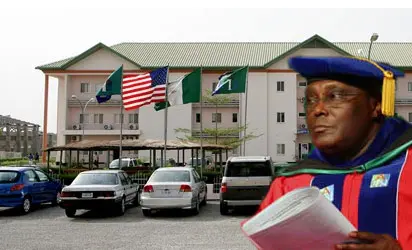CAN a university commence as a “Development University” and from the onset, create a niche of social responsibility within the community of its location? And can such devotion to development be central to the university’s academic experience such that year-in, year-out, the community service experience can impact on the social existence of the community?
These were thoughts I wrestled with over the last weekend, in Yola, the Adamawa state capital. I had attended the Founder’s Day ceremonies and it was an epiphany for me! I was educated in the Nigerian public school system, from the primary through to the tertiary levels. The quality of learning was excellent and facilities were good enough to give us an education that made us confident and competitive citizens of the world. I have therefore been a passionate advocate of the public school system.
But the system which produced people of my generation has gradually been driven into a state of crisis, over decades of under-funding; decay of infrastructure; a drop in teaching staff quality; pervasive public service corruption in general and the huge population of students that need inadequate services. So many parents, including this reporter, have had to massively invest in educating their children in very expensive private schools.
But the more money I have spent in educating my kids in private schools, the more I have longed for and written in advocacy for well-funded; properly run public schools, up to the university system. Recently, I commenced a passionate debate with my wife about choice of university for our growing children. I retreated into the trenches for public universities, despite awareness of their state. It is a debate we have not resolved.
So I received the invitation to attend the Founder’s Day ceremonies at the AmericanUniversity of Nigeria, AUN, Yola with mixed emotions really. On the one hand was my ideologically-driven preference for the public educational niche and a not-too-subtle hostility to private education. AUN was an interesting experience.
The first thing that struck me was not just the beauty of the sprawling university campus, with the incredible level of infrastructure as well as its multi-national faculty. The most incredible introduction to the university is the driving vision as communicated by President Margee Ensign and her ability to inspire faculty, staff and students alike to own and actualize the vision.
Dr. Ensign is an enchanting American Political Economist, who is totally committed to achieve the “development university” vision that drove the founding of the institution. From the initial briefing to the crowded programme of events, she communicated her enthusiasm for the work being done with the young Nigerians studying in the university along with other African youths.
The students displayed works carried out in the context of community service outreach and they were convincing in their presentations. Students and faculty members alike, seem to relate with mutual respect and shared feeling for the work to build the university and graduate students prepared for the world of the Twenty-First Century; that brought the experience of our visit together in an engaging manner.
I was curious about how the lecturers were recruited and it became clear that most found irresistible a space to impact on the lives of young Africans, often far away from their homes, and are giving it their best. Some probably came with trepidations about the Nigerian situation, but the setting of AUN and the willingness to learn amongst the students assisted both sides, faculty and students, to flower as they tucked into their work with gusto and enthusiasm.
The community service is the best example of how the university opened the vistas of the students to what they could give back to their communities and country.
Most came from privileged backgrounds where they probably never encountered poverty; deprivations and lack of opportunity. But as students of AUN, they are obliged to encounter deprived urban and rural communities to assist with teaching; renovating health institutions and several other practically oriented services and in helping to improve social life, they have also began to transform their own lives.
They know better now, that their education is not just for them to earn a diploma and make a personal career success only; they have a social responsibility to assist in deploying education and skills to make the world a better place.
I think the university’s greatest source of pride is the contribution it has made to inter-faith and inter-community peace building in Adamawa state. We sat through two sessions of the Yola Peace Council and listened to various speakers on all sides of the divides that have led to crises phenomena in recent years in Northern Nigeria. There was a frank exchange of views and more importantly, there was respect for the other person’s perspective.
The mustard seed of peace has been collectively planted in Adamawa state and the AUN has been such an interested party in helping it grow,potentially, into a giant oak! Into the future, there are possibilities of harmony that will redound to the benefit of all. I have not tried to use this piece to just state the pretty face of the AmericanUniversity of Nigeria (AUN) Yola.
I asked President Ensign a frontal question about allegations of drug abuse amongst the children of the rich at the university. She told me that three years ago, they used to collect bottles of cough syrup around the campus; a tell tale sign of drug use. But a combination of counseling; disciplinary procedures and greater engagement of the students in positive endeavours turned things around for the better! I left Yola very impressed about strides made at the AmericanUniversity of Nigeria.
This is without prejudice to my reservations about the private/public divide in the provision of tertiary education in our country. The Nigerian university system in general, public and private, has a lot it can learn from the commitment to vision and purpose which drive the AUN in Yola.


